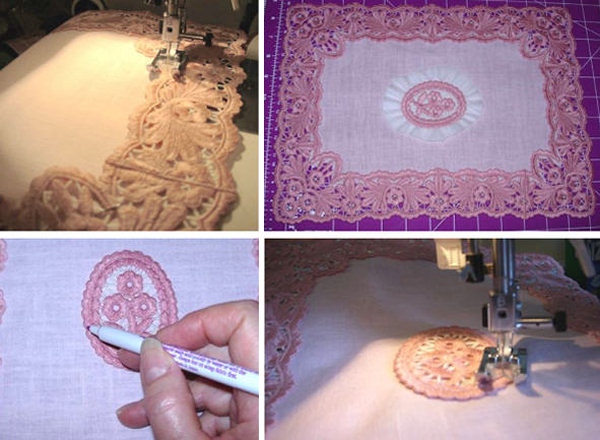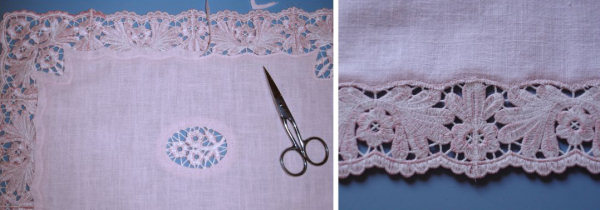|
1. Embroider all lace
designs that you will need for assembling the project, using 2-3 layers of
water-soluble fabric, on lowest speed your machine allows.
The number of Water-Soluble
Stabilizer layers depends on type of backing you use, and on design
density; for Dantela
lace designs we've always used 2 layers of fabric WSB
Attention: It may seem to you that one layer of strong WSB is enough.
Yet, many machines start breaking thread terribly, when only one layer on WSB
is used. We've noticed that often an extra layer of water-soluble just solves
this problem. So avoid trying to save an extra layer, even if your WSB is very
strong. And if you still see many thread breaks with 2 layers - try to add a
third one.
It's best to embroider each section in separate hoop. For each design, try to
pick up the smallest suitable hoop you can.
Make sure that hooped WSB can't move, even slightly. If your hoop is far from
perfect, and holds fabric badly - consider purchasing a new hoop with special
metal spins. This is quite a small expense that can take your embroidery to a
totally new level. Most machine dealers now carry those wonderful new hoops
with spins. As a temporary solution, you can wrap a paper towel around one hoop
frame, to add friction and prevent your backing from moving.
After you've stitched all lace pieces, cut away large edges of water-soluble
backing around each design, leaving about 1 inch from each side. Position the
laces on plain surface in correct order, like this:

WHILE THE WSB STILL THERE, position all lace pieces PRECISELY like
they should be on finished project, and attach them together, using sewing
pins:

3. Sew all pieces together on your sewing machine (use zigzag stitch).

4. When all frame details are attached, wash away the water-soluble
fabric.
Be sure to wash it away carefully, without stretching or deforming the lace. If
you want the lace to be as soft as possible - you may even leave the item in
warm water for half an hour or so, to make all water soluble substance go away.
Once the backing dissolves, position the lace symmetrically on plain surface
covered by a towel, and straighten the lace with your fingers, to make sure it
gets back to it's ideal shape. Any deformation will be especially noticeable on
item that must be symmetric, so be thorough and careful when performing this
step.
Let the lace dry. You may use iron & towel to speed up the process.
Attention: it's a good idea to wash away the backing at this early step
ONLY in certain cases. For example, this placemat project is large and it is
easier to continue working with it without the backing. In other cases, it may
be better to sew the lace parts to fabric while WSB is still there, and wash
away the backing only when the project is assembled completely.

5. Position the lace border over fabric base, mark the inside edges on
fabric using disappearing textile pencil, and cut away the edges leaving about
1/2 inch allowance around the marks, and pin the lace to fabric base.

6. Sew the lace frame onto the fabric base, using regular running
stitch. Use same thread color like on the design top. Use invisible thread ONLY
if you have absolutely no choice.
We've also noticed that 60wt bobbin thread works much better for this purpose
than regular 40wt embroidery thread. That's another reason to use prewound
color bobbins in same color like your top thread. You can then use the bobbin
on top, when sewing the lace to fabric base.
Repeat steps 4 to 6 with the lace medallion decoration.

7. Cut away the excess fabrics edges, and finish the edges on your
sewing machine, using small and relatively dense zigzag stitch, in following
manner:

8. Ready!
If you'd like to get Dantela Table Lace, stabilizer or thread used in this
project - please visit these links:
Dantela Lace Designs
Machine Top & Bobbin Embroidery Thread
Water soluble fabric
Next ->
|
